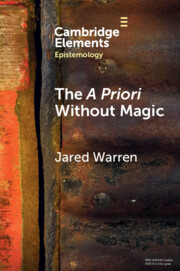Element contents
The A Priori without Magic
Published online by Cambridge University Press: 20 September 2022
Summary
- Type
- Element
- Information
- Series: Elements in EpistemologyOnline ISBN: 9781009030472Publisher: Cambridge University PressPrint publication: 13 October 2022
References
- 15
- Cited by

